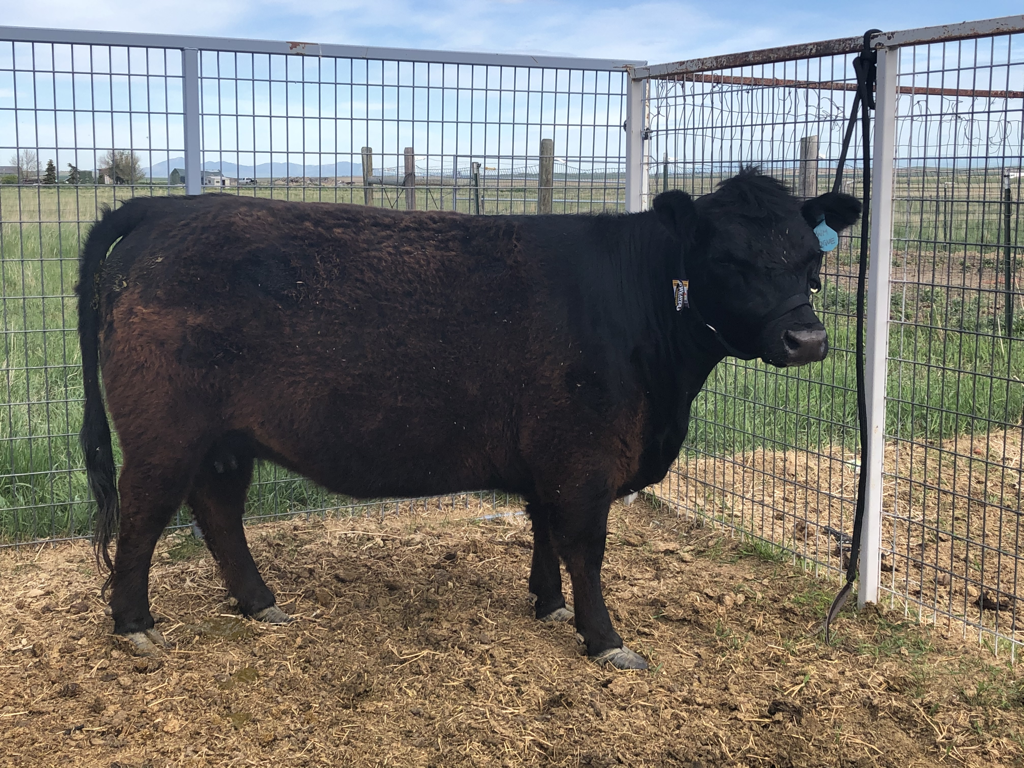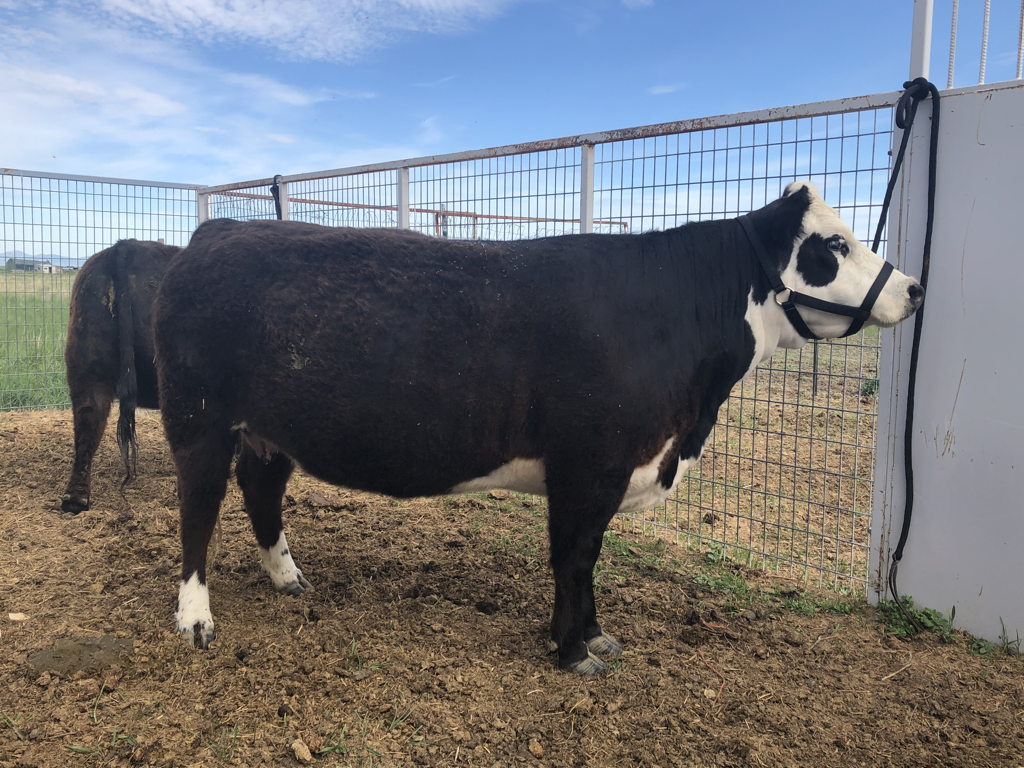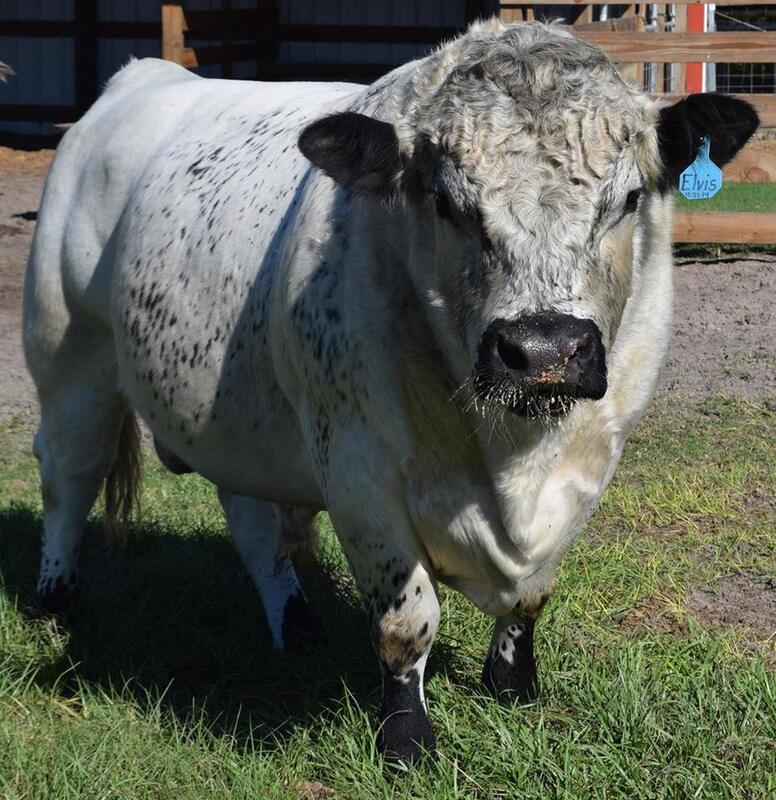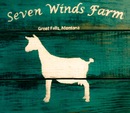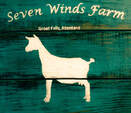My intent with the mini cattle is to raise quality beef in a scaled-down size. These smaller cattle require less inputs (hay, water, etc) and are a more suitable size for smaller portions and less freezer space and beef needs. I searched for Aberdeen (aka lowline angus) and mini hereford type cattle to start toward my goal. There are many mini type breeds out there, I found these breeds to most suitable for my needs - a perfect mini beef cow!
Due to my own time constraints and with the cost of hay this year, the cows have been sold. I am very sad to see them go, but I just have too many projects going on and something has to give.
Due to my own time constraints and with the cost of hay this year, the cows have been sold. I am very sad to see them go, but I just have too many projects going on and something has to give.
WM Rogue (MF 32447) - Moderator Aberdeen - SOLD
|
DOB: 3/25/2017
71.88% Aberdeen, 25% Hereford Homozygous black, Heterozygous polled Hip height: Approx 43 inches Sire: TL Wanamara Vanderbolt (FM6209) Fullblood Aberdeen Sire's Sire: Kimbolton Elliot (AULM6398) Fullblood Aberdeen Sire's Dam: Wanamara Emu Dreaming (5519) Fullblood Aberdeen Dam: Miss Chevious (MF25888) 43.75% Aberdeen, 50% Hereford Dam's Sire: GL Almost Frosty 13T (PM6178) Purebred Aberdeen Dam's Dam: RR BabyCakes (25887) 100% Hereford Click here for full pedigree info Rogue is being left open for 2021 so that I can catch her up for spring calves instead of late summer/fall calves. Calving History: 2019: 1 heifer calf sired by Aberdeen bull 2020: 1 bull calf sired by unregistered mini belted bull |
Lilly - Unregistered Mini Hereford/Aberdeen cross - SOLD
|
DOB: April 23, 2017
Mini Hereford/Aberdeen cross Black baldie, Heterozygous polled Hip height: Approx 43" Lily is being left open for 2021 so that I can catch her up for spring calves instead of late summer/fall calves. Calving History: 2019: 1 steer calf sired by mini bull 2020: 1 heifer calf sired by angus bull |
From the American Aberdeen Associaton:
American Aberdeen cattle are easy calving, good natured cattle that are very feed efficient and maintain themselves on grass. They have excellent taste, texture and tenderness beef characteristics and exceptional ribeye area per hundred pounds of body weight which translates to very high yielding, high quality, high value beef carcasses.
American Aberdeens answer the challenges of both the large scale rancher and the small acreage farmers.
For the large scale ranch operation, American Aberdeens lower labor and veterinary costs and provide many economic advantages. Commercial heifers bred to fullblood American Aberdeen bulls calve easily and breed back quickly, reducing the calving interval. Halfblood American Aberdeen cows maintain themselves on about half the feed that is required by a full size crossbred cow and wean more pounds of calf per acre.
American Aberdeen cattle are also a perfect choice for small acreage farmers. Their small size makes them easy to handle and minimizes equipment requirements. Their feed efficiency improves the carrying capacity of a farm. They produce exceptional quality beef. They are ideal show animals for 4-H and other youth projects bringing in the next generation of cattle people. They may also offer the tax advantages of an agriculturally based property and business.
American Aberdeen cross cattle are extremely well suited to grass-fed beef production as they are easy fleshing and will finish on a high roughage ration, producing high value carcasses with a minimum of input costs.
American Aberdeen cattle were developed at the Trangie Research Centre in New South Wales, Australia. Animal Scientists began with a herd of registered Champion Angus cattle, purchased in 1929, that were carefully selected for high quality and small size. The end result was a breed of small, black, polled cattle with pure Angus genetics.
Mature American Aberdeen bulls generally fall into a range of 45-48 inches measured at the hip and weigh from 1,300 to 1,600 pounds. Mature cows generally measure from 42-46 inches at the hip and weigh between 900 and 1,100 pounds.
The American Aberdeen Association, headquartered in Parker, Colorado requires that all Fullblood American Aberdeens have DNA parentage verification to assure their genetic purity providing a breed integrity that is unmatched among other small breeds. The national registry has also established the tradition of an Annual National American Aberdeen Show, Sale and Convention at the National Western Stock Show in Denver, providing a prestigious showplace for the top bloodlines in the breed as well as an ideal setting to share thoughts, ideas and mingle with other American Aberdeen breeders as well as the nation’s top cattlemen of all breeds.
The American Aberdeen Association provides four different programs to help you achieve your cattle breeding goals:
Full Blood
100% Aberdeen cattle—these cattle trace back to the Trangie Research Center and the original Angus purchased from Canada.
Aberdeen Plus
Percentage cattle (25%-87.5%)—Percentage cattle with the non-Aberdeen portion coming from registered American Angus or American Red Angus. The member must supply the registered, genetic defect-free pedigree and appropriate fee to enter the foundation animal into the Aberdeen Plus registry. The submitting member must be the recorded owner of the female at the time the calf was born. A flush report is required for all embryo transplant calves. Multi-generational cattle are accepted as long as the breed and percentage criteria are met. Either the sire or dam (or both) of the first generation Aberdeen Plus must be registered with the American Aberdeen Association.
Moderator
Percentage cattle (50%-87.499%)—Both sire and dam of a Moderator® must be registered with the American Aberdeen Association. Moderator shall be added to registration papers for these animals. (Animals that reach 87.5% or higher Aberdeen bloodline are considered Purebred for registration, although they will never be able to upgrade to Fullblood status.)
Moderator Plus
Percentage cattle (25% to 50%)—Aberdeen genetics on at least one side of the pedigree, and must be registered with the American Aberdeen Association. Either the sire or dam (or both) of a Moderator Plus® must be registered with the American Aberdeen Association. Moderator Plus shall be added to registration papers for these animals.
Frozen Boys! Semen in the tank for future use.
JWest's Little Elvis 69B - 30 straws FOR SALE!
|
BWCAA Registration #18131
Homozygous Polled Tested A2/A2 Birthweigh: 64 lbs At 3yrs old he was 50" at the hip (Frame Score 2) and 1,050lbs with a 38cm scrotal circumference. DNA is on file at UC Davis. Per his previous owner, he was crossed on small Dexter heifers with zero calving issues. Calves from non-british white dams are registerable with the British White Cattle Association of America as 50%. |
